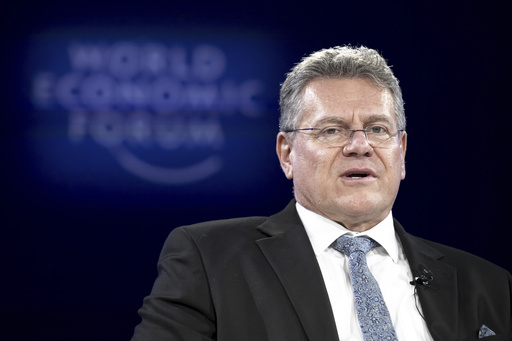WASHINGTON — In an effort to prevent a potential trade dispute, a senior official from the European Union highlighted the significance of active participation and equitable practices in trade during a lengthy meeting with officials from the Trump administration.
Maroš Šef?ovi?, the European Commissioner for Trade and Economic Security, communicated to reporters at a briefing following the meeting that “the primary objective relayed to us yesterday by our American counterparts is reciprocity.” This meeting took place with key figures, including Commerce Secretary Howard Lutnick, Kevin Hassett, Director of the White House National Economic Council, and Jamieson Greer, who has been nominated by President Donald Trump to serve as the U.S. Trade Representative.
Trump has introduced significant uncertainty into the long-standing U.S.-Europe partnership by proposing higher tariffs on European imports, aiming to create parity with the tariffs imposed on U.S. products. This proposed system of fair tariffs would also encompass the value-added tax (VAT) common in Europe, which operates similarly to a sales tax. This inclusion could lead to a substantial rise in import duties and might provoke escalated trade tensions, particularly if Europe opts for retaliatory measures. Such a trade conflict has the potential to slow down economic growth and spike inflation, which could lead to serious financial strains for many American families and diminish Trump’s support from voters, especially as they look for relief from rising prices ahead of the 2024 elections.
In addition to these tariffs, Trump has suggested imposing various sector-specific tariffs targeting automobiles, pharmaceuticals, and computer chips. He has already enacted a 25% tariff on steel and aluminum imports with no current provisions for exceptions. Furthermore, Trump has contemplated adding tariffs on imports from Mexico and Canada, basing these on concerns related to illegal immigration and drug trafficking, though he has momentarily paused these tariffs for continued negotiations. If implemented, these proposed import taxes could adversely affect the U.S. auto industry and others, potentially becoming effective as soon as March.
During a media briefing at the White House, Hassett noted that discussions had taken place between a Mexican delegation and both him and Lutnick regarding the ongoing issues. “Our goal is to ensure trade fairness,” Hassett stated.
Šef?ovi? sought to clarify the matter of the value-added tax, drawing comparisons to a sales tax as it is ultimately borne by the consumer, but acknowledged that this aspect remained unresolved during their discussions. He also pointed out that the meeting touched on China’s industrial overcapacity, especially concerning steel production, urging that the U.S. and EU collaborate to address this challenge rather than directing their focus against each other.
The EU official indicated that the meeting concluded with a commitment to finding ways to “generate positive momentum,” expressing a desire for the EU to act swiftly to sidestep the repercussions of retaliatory measures. He emphasized the importance of fostering personal relationships with U.S. counterparts, stating, “I’m pleased that we had the opportunity for such an intensive meeting. Moving forward, we must consider how to maintain this momentum and, hopefully, prevent unnecessary pain.”




